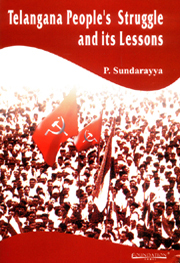Appendix II - The Conditions of Agricultural Workers and of the Poor Peasantry
from PART III
Published online by Cambridge University Press: 05 November 2011
Summary
(We are giving below some details of the conditions of agricultural labourers and the poor peasantry in different fighting areas of Telangana during 1948–1951 as well as the demands put forward by the Andhra Mahasabha and by our squads, on the basis of which they were mobilised. These give a graphic picture of the conditions of the peasantry in contrast to the land concentration in the hands of few landlords).
Huzurnagar Taluka
In Janapadu centre, the daily wages of an agricultural or rural labourer were two seers of paddy (by measure and not by weight) in the non-busy season; and three seers in the busy season. A farm servant was paid 60–80 seers per month, or 7–10 bags of paddy per year, each bag containing 75 kg. (100 seers) of paddy. The farm servant who managed the farm of the landlord and was considered the most reliable and highest paid, used to get three meals a day and Rs. 100 per annum.
In some villages of Vijayanagar centre, in the Kapugallu centre and in the Mattampalli centre, where the lands are more fertile, and also in the black soil region, daily wages varied from three measures (three seers) of paddy or two measures (seers) of jowar in the non-busy season to 6 seers of paddy or one meal plus three seers of jowar in the busy season. In those areas, the farm servants were paid Rs. 100 to Rs. 120 per year with three meals a day, or Rs. 300 without meals.
- Type
- Chapter
- Information
- Telengana People's Struggle and it's Lessons , pp. 387 - 403Publisher: Foundation BooksPrint publication year: 2006



